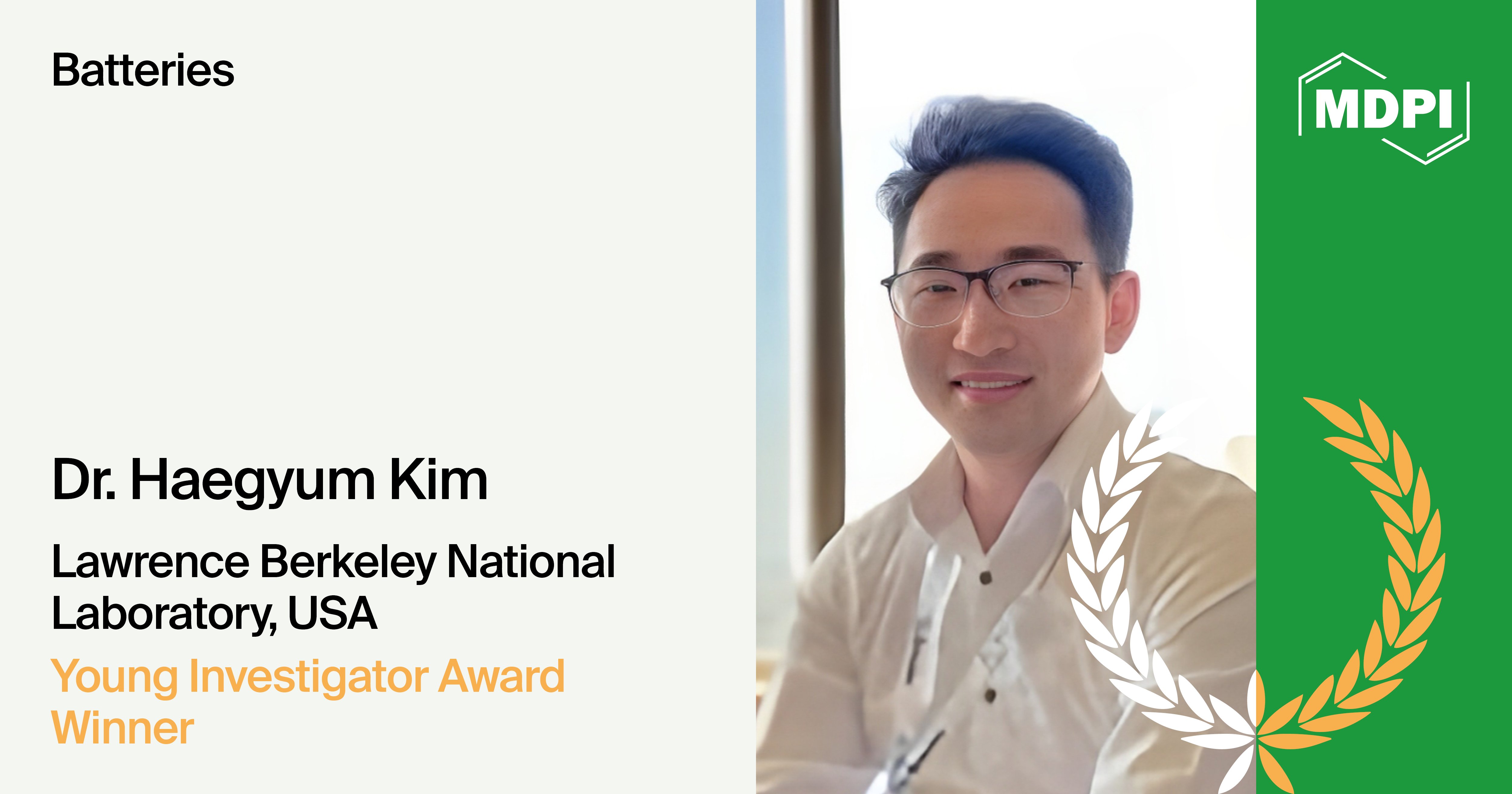
Journal Menu
► ▼ Journal Menu-
- Batteries Home
- Aims & Scope
- Editorial Board
- Reviewer Board
- Topical Advisory Panel
- Instructions for Authors
- Special Issues
- Topics
- Sections & Collections
- Article Processing Charge
- Indexing & Archiving
- Editor’s Choice Articles
- Most Cited & Viewed
- Journal Statistics
- Journal History
- Journal Awards
- Society Collaborations
- Conferences
- Editorial Office
- 10th Anniversary
Journal Browser
► ▼ Journal BrowserNeed Help?
Announcements
8 April 2025
Interview with Dr. Haegyum Kim—Winner of the Batteries 2024 Young Investigator Award

Name: Dr. Haegyum Kim
Affiliation: Materials Sciences Division, Lawrence Berkeley National Laboratory, Berkeley, CA, USA
Research interests: macromolecular and materials chemistry; materials engineering; interdisciplinary engineering; physical chemistry (incl. structural); electrical and electronic engineering
The Batteries Young Investigator Award was established in 2022 to acknowledge the achievements of young investigators in the field of battery technology and materials. The winner was chosen by the journal’s award committee.
Let us hear his opinions and find out about his experiences with scientific research and awards.
1. Could you briefly introduce yourself to our readers and tell us a little bit about your fields of interest?
I am a career staff scientist in the Materials Sciences Division at Lawrence Berkeley National Laboratory. I earned my Ph.D. from Seoul National University under the supervision of Prof. Kisuk Kang. In 2016, I joined Lawrence Berkeley National Laboratory as a postdoctoral researcher under the supervision of Prof. Gerbrand Ceder and was promoted to the position of staff scientist three years later.
Since my Ph.D., my research has focused on the synthesis–structure–property relationships of materials for next-generation and beyond Li-ion batteries. Early in my career, I investigated how material structures influence electrochemical responses during alkali–ion intercalation, providing insights for designing high-performance electrode materials. Over time, my interests have expanded to include synthesis science, where I have explored reaction mechanisms to establish guiding principles for synthesizing novel electrode materials. These efforts collectively aim to discover and develop new battery materials.
2. Could you elaborate on how you initially learned about the Batteries journal? Furthermore, what inspired you to apply for the Batteries Young Investigator Award 2024?
I first became aware of Batteries a few years ago while writing a review paper, where I found several exciting studies published in the journal that were valuable and cited in my work.
The Batteries Young Investigator Award was introduced in 2022, at a time when there were few awards recognizing young researchers in the battery field. Winning such an award provides a great opportunity to showcase one’s work and gain visibility as an emerging scientist. I have applied for this award three times and was honored to be selected as a winner this year. Seeing the esteemed researchers who had previously received this recognition motivated me to reapply, and I am grateful to now be among them.
3. Do you have any advice for aspiring young researchers looking to make a meaningful impact in their respective fields?
My advice to young researchers is to pursue what truly excites them, rather than simply following trends or aiming to look impressive. Even if others disagree with their research direction, they should stay committed if they feel a strong motivation and genuine excitement for their work. However, it is equally important to engage with skeptics by providing stronger evidence and well-supported hypotheses to make a compelling case for their ideas.
This was the most valuable advice I received from my mentor, and I hope to pass it on to the next generation of researchers.
I often face difficulties while conducting research, but that is the nature of being a scientist. I have come to accept this reality and even find enjoyment in these challenges. Overcoming obstacles gives me a sense of excitement and makes the process truly rewarding.
5. What is your opinion of the open access model of publishing?
There are both advantages and disadvantages. Open access makes research papers widely available to everyone, promoting knowledge sharing. However, the high publication fees place a significant burden on young scientists. Those with limited research funding often struggle to afford publishing in open access journals.
6. Which research topics do you think are of particular interest to the research community in the coming years?
AI for science and energy storage/conversion will continue to gain significant traction in the coming years.
7. Could you share your vision for the future of your research and the contributions you aspire to make in the field of batteries?
Metastable compounds often possess promising electrochemical properties for battery applications, yet their synthesis remains a significant challenge. My vision is to establish fundamental principles to understand and control the synthesis process, paving the way for the development of unexplored metastable compounds for next-generation batteries.
8. As the winner of this award, is there something you want to express or someone you wish to thank?
I am deeply grateful to my former advisors, Prof. Kisuk Kang and Prof. Gerbrand Ceder, for shaping my journey as a materials scientist. I also sincerely appreciate the nominators who supported my award application, as well as my collaborators, including both former and current group members, who have contributed to the exciting field of battery science. Lastly, I want to express my heartfelt gratitude to my wife and family, whose unwavering support means everything to me.



